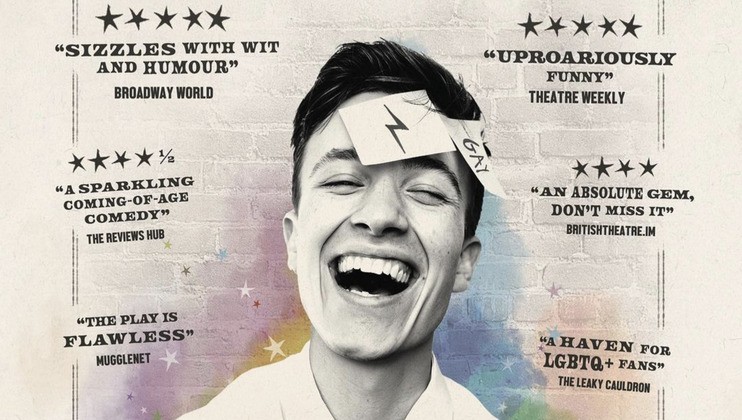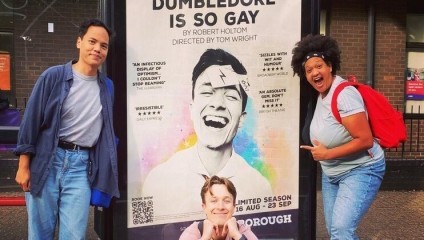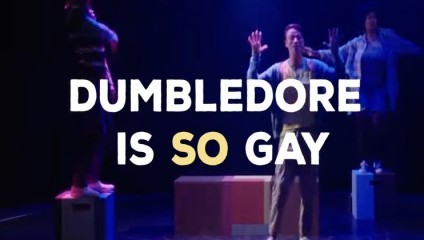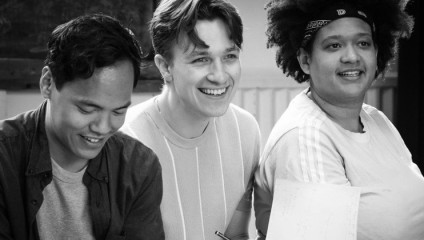An Interview with Alex Britt of Dumbledore Is So Gay
Debuting on 16th August at Southwark Playhouse, Dumbledore Is So Gay is coming to London. Following the intimate story of a youthful Harry Potter fan and his journey coming out, we sat down with lead actor Alex Britt to discuss his creative process...

Hi Alex, what inspired you to begin acting? Has this inspiration remained the same or changed over time?
It’s funny, I can’t remember a time when I wasn’t acting, really. I had a lot of…let’s say…energy…when I was a kid… I was always banging on things, making noise, pretending to be other people. So, I think my parents just wanted something/somewhere I could put all that excess energy, so they enrolled me in a Saturday school for drama from quite an early age and from that moment I never really looked back. Back then, I think I just quite enjoyed having the chance to show off – having a space where I was allowed to be loud, and funny. The centre of attention, without getting in trouble like I would in school!
But I don’t think it was really something I was aware you could pursue, or have a ‘career’ in. I think that came when I was about sixteen or so, and I actually started going to the theatre more and started watching and analysing actors’ performances. I think that’s when it clicked for me. That this was something I wanted to do for the rest of my life. In terms of inspiration, it has definitely changed over time. I’m far more inspired now by good stories and interesting, and complex characters. Before, it was all about just doing it, in any way possible. To escape, and get lost in something: a world that doesn’t quite exist, but, yet somehow, does at the same time. To perform for an audience, and get validated for it. But now, I like to be challenged in my work. I like murky stories that aren’t quite what they seem when you first encounter them. Characters that have layers, and a lot going on below the surface.
I’m also constantly inspired by new writing: new plays, and new interpretations of old ones. And films. Films have had a big impact on me, and why I love what I do. There are some performances and actors that have been essential in inspiring me to keep going and to try different things. Some Like It Hot is one of many examples I could give.

What was it about Dumbledore Is So Gay that drew you in?
I think it was just such a truthful and compelling story. Jack is a character I really recognise and resonate with fully. Still, after all this time. He’s a character in which I totally see myself – his story is my story. Throughout the play, he has to come to terms with who he is and who he’s attracted to, in a time where, although attitudes began shifting significantly, it was still difficult to accept yourself and be accepted by your peers. Like a lot of queer people my age and older, I remember distinctly that “gay” meant bad. It was just embedded in you. It was the language we used at school. It was a descriptive word, an insult, used not only on me but everyone.
So, very much like Jack, I found it incredibly hard to find my place in school and to see the outside world in a positive light. Until I left, and found my tribe somewhere else. Ultimately, Robert Holtom (our brilliant writer) has written a story so full of wit, of poignancy, and hope, that, in my opinion, it’s hard not to get drawn in by it. From first read, or first watch.
What do the stories contained in Harry Potter mean to you? Did you grow up reading the books?
I did read the Harry Potters growing up and have read them a lot since. Initially, they were read to me. It was kind of a family event; Dad would read them to my sister and I before bed, putting on different voices for the characters, and fully immersing us in Harry’s magical world. It would be my favourite time of day. But I always felt the chapters were never long enough, as he’d only read one, and when they finished, I’d be made to go to bed! (But then, I’d just stay up in bed and listen to Stephen Fry reading the chapter we’d just read that night…)
But I think, for a lot of people, and, especially for my generation, they’re incredibly comforting stories. They’re pure escapism. I’ve read them a lot in times of uncertainty – I remember re-reading all of them when the pandemic hit in 2020, and we weren’t sure what was going to happen, and how long we’d be stuck inside for. And it really helped me to remember the little kid who loved hearing stories, allowing me to get lost in another world, whilst it felt like our own was falling apart somewhat. So I think, like all good stories, there’s something/someone to root for. And something to believe in. There are characters to empathise with, with traits where you can recognise yourself and feel represented. They were my first real route into long-form storytelling, and, despite not agreeing personally with a lot of the author’s current viewpoints, the stories do still hold a very special place in my heart. They remain magical, and personal, to me, and many others.

Could you shine a light on someone involved in the production that has you feel has made it special?
I know this is such a cop-out…but there are really too many to name just one. I’d love to shine a light and shout out everybody, if I may, because I do feel incredibly lucky to work with such brilliant, creative and inspiring artists on this show!
Charlotte Dowding, who’s been in it with me since the start, is quite simply brilliant, she’s a natural comedian and has made me laugh, more times than I can count.
Martin Sarreal, who has just joined our cast, has been an incredible addition. He’s picked up everything so fast, and in such an impressive manor. He has been such a beautiful supplement to an already wondrous team.
Tom Wright, our fantastic director, has brought such wisdom and humour to the show, since the beginning. It’s always such a joy and pleasure working with him. We have a shared language and understanding, and he always knows how to inspire and get the best out of me.
Jennifer Davis, our amazing associate director, has really helped me see Jack, his struggles and humour in a new light, adding depth, passion and hilarity to a show I already loved.
Robert Holtom, our writer, for writing such a timely, important, funny, and heartfelt show. And capturing a dream role for me in Jack.
Rachael Nanyonjo, our movement director, for being a feracious and positive force, brimming with brilliant ideas on how to make the show slick and smooth, but at the same time other-worldly: spiky and abstract.
Natalie Johnson, our wonderful set and costume designer, for creating a set of such wonder and flexibility, allowing us to play with time and space in entertaining, and creative ways.
Rory Beaton, our fabulous lighting designer, without whom no one would see our work(!), but who also adds constant flair and energy to the show, with imaginative, and sharp lighting design.
Peter Wilson, for composing and designing such gorgeous soundscapes, and compositions, which add so much depth, emotion and wonder to the show, and, most of the time, his work helps us to know where we’re going next in this fast-paced, crazy show!
Hannah Elsy, for being an incredibly tenacious, dedicated, and caring producer. Without her passion and ambition for this project, we wouldn’t have had the opportunity to do this again, for which I am so grateful!
And lastly, but by no means least, Tamasin Cook, our glorious stage manager. A woman who is so incredibly hard-working, poised, insightful, and observant, that we really wouldn’t be able to do the show without her, and her talents. I told you I’d shout out everyone… because seriously, it's no mean feat doing this show, and without everyone’s input, it would not be the show it is, and the experience would not feel the same…
More generally, do you prefer performing to a camera or on-stage?
Oh, that’s such a tough question, because they are such different mediums, requiring such different skill sets. I’ve grown quite fond of working on camera, and I’ve been very lucky to do it a lot more recently, due to the impact of Covid. With screen-acting, I like how ‘internal’ the work is. I love subtlety, and accurately trying to generate, and portray the whole spectrum of human emotion from the inside out. Feeling, not showing. It’s a really life-affirming and challenging experience.
I think when I first started working on camera, I didn’t understand it. I didn’t get what was required of me. I’d always feel like I was over-selling it or doing too much. But I hope I’ve finally started to understand it more. And I love being able to make mistakes, and doing things again, but slightly differently, with the knowledge that, sometimes, the final performance is actually out of your hands. It’s down to what the director and editor likes and wants in the final cut. However, there really is nothing quite like live theatre. The immediacy of an audience’s reaction. The flow of energy between actors on stage, and the people watching. A collective sound or feeling is heard or conveyed. Being backstage before a show, feeling nervous but excited to share a story, your work, with a whole new audience every night. Not knowing what could really happen once you’ve set foot out there. I’ve had several moments where I’ve never felt more alive than I have being in a theatre. On stage. Where I’ve totally forgotten that I’m being watched, where I’m totally committed to a false reality… I guess I’ve somewhat answered the question…live theatre really is like nothing else…

What practices or techniques do you use to get in the zone?
In terms of getting ‘in the zone’ it really differs from project to project. On a show like Dumbledore Is So Gay, there really isn’t time to get in the zone – except for just before the start, backstage. Because most of the time, I’m just trying not to think about what we’re about to do! And I’m trying to calm my nerves, so I don’t trip over my own feet actually walking on stage! Once I’m on in this show, I’m there for 75 minutes without coming off again, bouncing between different ages, and moments in time, and experiencing different emotions, expressions and scenarios, sometimes within mere seconds of each other. So if you think about it too much, you kind of get a bit spooked at the task ahead of you.
So, for me, I guess it’s really just about being present, with yourself, the audience, and my other cast mates, in the moment. From moment to moment. A good warm-up, vocal and physical… I always swear by yoga, as it gets you out of your head, and into your body: it is always helpful for that. And having a pre-show routine that doesn’t usually change, once I’ve figured out what I want/need. I think that just allows me, and my body, to recognise what we’re about to do/go through, and it gives me space to not think too much about what other things are going on in my life, and to focus on the show. Also, knowing that I’ve done enough work in rehearsals with the director to build the world and the character to realistically bring it all to life, and having confidence in the show.
For other projects, visualisation has been a great tool, and knowing where your character has just been, and where they think they’re going next. Or having character mantras, to get me into their headspace/mindset, and repeating those to myself just before I go on stage, has proved really helpful to me too.
Learn more and book Dumbledore Is So Gay here.